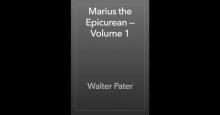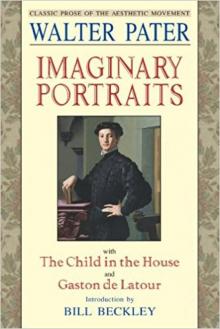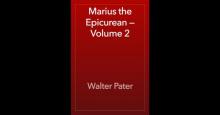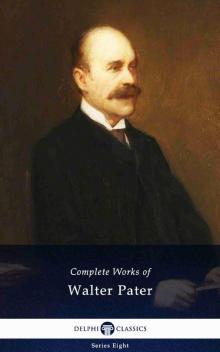- Home
- Walter Pater
Delphi Complete Works of Walter Pater Page 3
Delphi Complete Works of Walter Pater Read online
Page 3
And now what relieved in part this over-tension of soul was the lad’s pleasure in the country and the open air; above all, the ramble to the coast, over the marsh with its dwarf roses and wild lavender, and delightful signs, one after another — the abandoned boat, the ruined flood-gates, the flock of wild birds — that one was approaching the sea; the long summer-day of idleness among its vague scents and sounds. And it was characteristic of him that he relished especially the grave, subdued, northern notes in all that — the charm of the French or English notes, as we might term them — in the luxuriant Italian landscape.
CHAPTER III: CHANGE OF AIR
Dilexi decorem domus tuae.
THAT almost morbid religious idealism, and his healthful love of the country, were both alike developed by the circumstances of a journey, which happened about this time, when Marius was taken to a certain temple of Aesculapius, among the hills of Etruria, as was then usual in such cases, for the cure of some boyish sickness. The religion of Aesculapius, though borrowed from Greece, had been naturalised in Rome in the old republican times; but had reached under the Antonines the height of its popularity throughout the Roman world. That was an age of valetudinarians, in many instances of imaginary ones; but below its various crazes concerning health and disease, largely multiplied a few years after the time of which I am speaking by the miseries of a great pestilence, lay a valuable, because partly practicable, belief that all the maladies of the soul might be reached through the subtle gateways of the body.
Salus, salvation, for the Romans, had come to mean bodily sanity. The religion of the god of bodily health, Salvator, as they called him absolutely, had a chance just then of becoming the one religion; that mild and philanthropic son of Apollo surviving, or absorbing, all other pagan godhead. The apparatus of the medical art, the salutary mineral or herb, diet or abstinence, and all the varieties of the bath, came to have a kind of sacramental character, so deep was the feeling, in more serious minds, of a moral or spiritual profit in physical health, beyond the obvious bodily advantages one had of it; the body becoming truly, in that case, but a quiet handmaid of the soul. The priesthood or “family” of Aesculapius, a vast college, believed to be in possession of certain precious medical secrets, came nearest perhaps, of all the institutions of the pagan world, to the Christian priesthood; the temples of the god, rich in some instances with the accumulated thank-offerings of centuries of a tasteful devotion, being really also a kind of hospitals for the sick, administered in a full conviction of the religiousness, the refined and sacred happiness, of a life spent in the relieving of pain.
Elements of a really experimental and progressive knowledge there were doubtless amid this devout enthusiasm, bent so faithfully on the reception of health as a direct gift from God; but for the most part his care was held to take effect through a machinery easily capable of misuse for purposes of religious fraud. Through dreams, above all, inspired by Aesculapius himself, information as to the cause and cure of a malady was supposed to come to the sufferer, in a belief based on the truth that dreams do sometimes, for those who watch them carefully, give many hints concerning the conditions of the body — those latent weak points at which disease or death may most easily break into it. In the time of Marcus Aurelius these medical dreams had become more than ever a fashionable caprice. Aristeides, the “Orator,” a man of undoubted intellectual power, has devoted six discourses to their interpretation; the really scientific Galen has recorded how beneficently they had intervened in his own case, at certain turning-points of life; and a belief in them was one of the frailties of the wise emperor himself. Partly for the sake of these dreams, living ministers of the god, more likely to come to one in his actual dwelling-place than elsewhere, it was almost a necessity that the patient should sleep one or more nights within the precincts of a temple consecrated to his service, during which time he must observe certain rules prescribed by the priests.
For this purpose, after devoutly saluting the Lares, as was customary before starting on a journey, Marius set forth one summer morning on his way to the famous temple which lay among the hills beyond the valley of the Arnus. It was his greatest adventure hitherto; and he had much pleasure in all its details, in spite of his feverishness. Starting early, under the guidance of an old serving-man who drove the mules, with his wife who took all that was needful for their refreshment on the way and for the offering at the shrine, they went, under the genial heat, halting now and then to pluck certain flowers seen for the first time on these high places, upwards, through a long day of sunshine, while cliffs and woods sank gradually below their path. The evening came as they passed along a steep white road with many windings among the pines, and it was night when they reached the temple, the lights of which shone out upon them pausing before the gates of the sacred enclosure, while Marius became alive to a singular purity in the air. A rippling of water about the place was the only thing audible, as they waited till two priestly figures, speaking Greek to one another, admitted them into a large, white-walled and clearly lighted guest-chamber, in which, while he partook of a simple but wholesomely prepared supper, Marius still seemed to feel pleasantly the height they had attained to among the hills.
The agreeable sense of all this was spoiled by one thing only, his old fear of serpents; for it was under the form of a serpent that Aesculapius had come to Rome, and the last definite thought of his weary head before he fell asleep had been a dread either that the god might appear, as he was said sometimes to do, under this hideous aspect, or perhaps one of those great sallow-hued snakes themselves, kept in the sacred place, as he had also heard was usual.
And after an hour’s feverish dreaming he awoke — with a cry, it would seem, for some one had entered the room bearing a light. The footsteps of the youthful figure which approached and sat by his bedside were certainly real. Ever afterwards, when the thought arose in his mind of some unhoped-for but entire relief from distress, like blue sky in a storm at sea, would come back the memory of that gracious countenance which, amid all the kindness of its gaze, had yet a certain air of predominance over him, so that he seemed now for the first time to have found the master of his spirit. It would have been sweet to be the servant of him who now sat beside him speaking.
He caught a lesson from what was then said, still somewhat beyond his years, a lesson in the skilled cultivation of life, of experience, of opportunity, which seemed to be the aim of the young priest’s recommendations. The sum of them, through various forgotten intervals of argument, as might really have happened in a dream, was the precept, repeated many times under slightly varied aspects, of a diligent promotion of the capacity of the eye, inasmuch as in the eye would lie for him the determining influence of life: he was of the number of those who, in the words of a poet who came long after, must be “made perfect by the love of visible beauty.” The discourse was conceived from the point of view of a theory Marius found afterwards in Plato’s Phaedrus, which supposes men’s spirits susceptible to certain influences, diffused, after the manner of streams or currents, by fair things or persons visibly present — green fields, for instance, or children’s faces — into the air around them, acting, in the case of some peculiar natures, like potent material essences, and conforming the seer to themselves as with some cunning physical necessity. This theory,* in itself so fantastic, had however determined in a range of methodical suggestions, altogether quaint here and there from their circumstantial minuteness. And throughout, the possibility of some vision, as of a new city coming down “like a bride out of heaven,” a vision still indeed, it might seem, a long way off, but to be granted perhaps one day to the eyes thus trained, was presented as the motive of this laboriously practical direction.
“If thou wouldst have all about thee like the colours of some fresh picture, in a clear light,” so the discourse recommenced after a pause, “be temperate in thy religious notions, in love, in wine, in all things, and of a peaceful heart with thy fellows.” To keep the eye clear by a sort of exq
uisite personal alacrity and cleanliness, extending even to his dwelling-place; to discriminate, ever more and more fastidiously, select form and colour in things from what was less select; to meditate much on beautiful visible objects, on objects, more especially, connected with the period of youth — on children at play in the morning, the trees in early spring, on young animals, on the fashions and amusements of young men; to keep ever by him if it were but a single choice flower, a graceful animal or sea-shell, as a token and representative of the whole kingdom of such things; to avoid jealously, in his way through the world, everything repugnant to sight; and, should any circumstance tempt him to a general converse in the range of such objects, to disentangle himself from that circumstance at any cost of place, money, or opportunity; such were in brief outline the duties recognised, the rights demanded, in this new formula of life. And it was delivered with conviction; as if the speaker verily saw into the recesses of the mental and physical being of the listener, while his own expression of perfect temperance had in it a fascinating power — the merely negative element of purity, the mere freedom from taint or flaw, in exercise as a positive influence. Long afterwards, when Marius read the Charmides — that other dialogue of Plato, into which he seems to have expressed the very genius of old Greek temperance — the image of this speaker came back vividly before him, to take the chief part in the conversation.
It was as a weighty sanction of such temperance, in almost visible symbolism (an outward imagery identifying itself with unseen moralities) that the memory of that night’s double experience, the dream of the great sallow snake and the utterance of the young priest, always returned to him, and the contrast therein involved made him revolt with unfaltering instinct from the bare thought of an excess in sleep, or diet, or even in matters of taste, still more from any excess of a coarser kind.
When he awoke again, still in the exceeding freshness he had felt on his arrival, and now in full sunlight, it was as if his sickness had really departed with the terror of the night: a confusion had passed from the brain, a painful dryness from his hands. Simply to be alive and there was a delight; and as he bathed in the fresh water set ready for his use, the air of the room about him seemed like pure gold, the very shadows rich with colour. Summoned at length by one of the white-robed brethren, he went out to walk in the temple garden. At a distance, on either side, his guide pointed out to him the Houses of Birth and Death, erected for the reception respectively of women about to become mothers, and of persons about to die; neither of those incidents being allowed to defile, as was thought, the actual precincts of the shrine. His visitor of the previous night he saw nowhere again. But among the official ministers of the place there was one, already marked as of great celebrity, whom Marius saw often in later days at Rome, the physician Galen, now about thirty years old. He was standing, the hood partly drawn over his face, beside the holy well, as Marius and his guide approached it.
This famous well or conduit, primary cause of the temple and its surrounding institutions, was supplied by the water of a spring flowing directly out of the rocky foundations of the shrine. From the rim of its basin rose a circle of trim columns to support a cupola of singular lightness and grace, itself full of reflected light from the rippling surface, through which might be traced the wavy figure-work of the marble lining below as the stream of water rushed in. Legend told of a visit of Aesculapius to this place, earlier and happier than his first coming to Rome: an inscription around the cupola recorded it in letters of gold. “Being come unto this place the son of God loved it exceedingly:” — Huc profectus filius Dei maxime amavit hunc locum; — and it was then that that most intimately human of the gods had given men the well, with all its salutary properties. The element itself when received into the mouth, in consequence of its entire freedom from adhering organic matter, was more like a draught of wonderfully pure air than water; and after tasting, Marius was told many mysterious circumstances concerning it, by one and another of the bystanders: — he who drank often thereof might well think he had tasted of the Homeric lotus, so great became his desire to remain always on that spot: carried to other places, it was almost indefinitely conservative of its fine qualities: nay! a few drops of it would amend other water; and it flowed not only with unvarying abundance but with a volume so oddly rhythmical that the well stood always full to the brim, whatever quantity might be drawn from it, seeming to answer with strange alacrity of service to human needs, like a true creature and pupil of the philanthropic god. Certainly the little crowd around seemed to find singular refreshment in gazing on it. The whole place appeared sensibly influenced by the amiable and healthful spirit of the thing. All the objects of the country were there at their freshest. In the great park-like enclosure for the maintenance of the sacred animals offered by the convalescent, grass and trees were allowed to grow with a kind of graceful wildness; otherwise, all was wonderfully nice. And that freshness seemed to have something moral in its influence, as if it acted upon the body and the merely bodily powers of apprehension, through the intelligence; and to the end of his visit Marius saw no more serpents.
A lad was just then drawing water for ritual uses, and Marius followed him as he returned from the well, more and more impressed by the religiousness of all he saw, on his way through a long cloister or corridor, the walls well-nigh hidden under votive inscriptions recording favours from the son of Apollo, and with a distant fragrance of incense in the air, explained when he turned aside through an open doorway into the temple itself. His heart bounded as the refined and dainty magnificence of the place came upon him suddenly, in the flood of early sunshine, with the ceremonial lights burning here and there, and withal a singular expression of sacred order, a surprising cleanliness and simplicity. Certain priests, men whose countenances bore a deep impression of cultivated mind, each with his little group of assistants, were gliding round silently to perform their morning salutation to the god, raising the closed thumb and finger of the right hand with a kiss in the air, as they came and went on their sacred business, bearing their frankincense and lustral water. Around the walls, at such a level that the worshippers might read, as in a book, the story of the god and his sons, the brotherhood of the Asclepiadae, ran a series of imageries, in low relief, their delicate light and shade being heightened, here and there, with gold. Fullest of inspired and sacred expression, as if in this place the chisel of the artist had indeed dealt not with marble but with the very breath of feeling and thought, was the scene in which the earliest generation of the sons of Aesculapius were transformed into healing dreams; for “grown now too glorious to abide longer among men, by the aid of their sire they put away their mortal bodies, and came into another country, yet not indeed into Elysium nor into the Islands of the Blest. But being made like to the immortal gods, they began to pass about through the world, changed thus far from their first form that they appear eternally young, as many persons have seen them in many places — ministers and heralds of their father, passing to and fro over the earth, like gliding stars. Which thing is, indeed, the most wonderful concerning them!” And in this scene, as throughout the series, with all its crowded personages, Marius noted on the carved faces the same peculiar union of unction, almost of hilarity, with a certain self-possession and reserve, which was conspicuous in the living ministrants around him.
In the central space, upon a pillar or pedestal, hung, ex voto, with the richest personal ornaments, stood the image of Aesculapius himself, surrounded by choice flowering plants. It presented the type, still with something of the severity of the earlier art of Greece about it, not of an aged and crafty physician, but of a youth, earnest and strong of aspect, carrying an ampulla or bottle in one hand, and in the other a traveller’s staff, a pilgrim among his pilgrim worshippers; and one of the ministers explained to Marius this pilgrim guise. — One chief source of the master’s knowledge of healing had been observation of the remedies resorted to by animals labouring under disease or pain — what leaf or berry the lizard or do
rmouse lay upon its wounded fellow; to which purpose for long years he had led the life of a wanderer, in wild places. The boy took his place as the last comer, a little way behind the group of worshippers who stood in front of the image. There, with uplifted face, the palms of his two hands raised and open before him, and taught by the priest, he said his collect of thanksgiving and prayer (Aristeides has recorded it at the end of his Asclepiadae) to the Inspired Dreams: —
“O ye children of Apollo! who in time past have stilled the waves of sorrow for many people, lighting up a lamp of safety before those who travel by sea and land, be pleased, in your great condescension, though ye be equal in glory with your elder brethren the Dioscuri, and your lot in immortal youth be as theirs, to accept this prayer, which in sleep and vision ye have inspired. Order it aright, I pray you, according to your loving-kindness to men. Preserve me from sickness; and endue my body with such a measure of health as may suffice it for the obeying of the spirit, that I may pass my days unhindered and in quietness.”

 Marius the Epicurean — Volume 1
Marius the Epicurean — Volume 1 Imaginary Portraits
Imaginary Portraits Marius the Epicurean — Volume 2
Marius the Epicurean — Volume 2 Delphi Complete Works of Walter Pater
Delphi Complete Works of Walter Pater